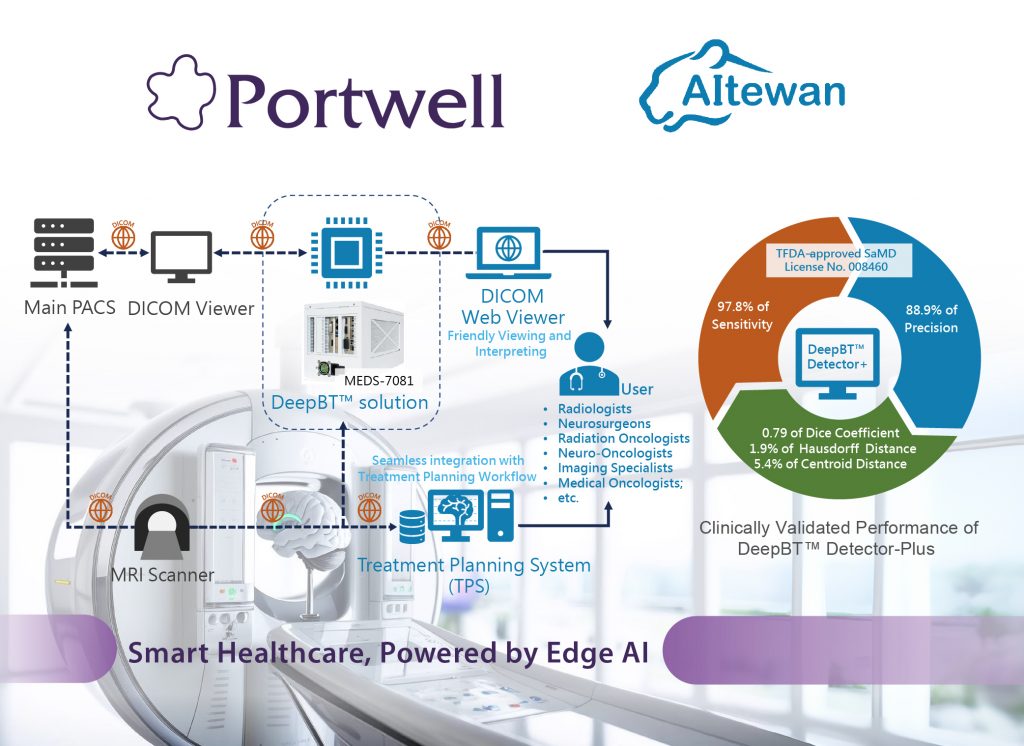
Why Is AI the Future of Brain Tumor Diagnosis?
As global demand for Smart Healthcare continues to rise, especially in brain tumor diagnosis, traditional MRI image analysis faces dual challenges of low efficiency and limited accuracy due to its reliance on complex medical knowledge and human expertise. According to World Health Organization statistics, approximately 864,000 people worldwide are diagnosed with brain tumors each year, with around 85,000 new cases in the United States in 2021 alone. The demand for MRI diagnostic equipment and specialized interpretation personnel keeps growing. Integrating edge computing to power AI-assisted diagnostic systems has become a clear trend. In particular, high-performance medical-grade devices such as Portwell’s MEDS-7081 enable rapid and precise analysis of large MRI images, facilitating early tumor detection and subsequent treatment monitoring, thereby significantly improving diagnostic efficiency and success rates.
Clinical Pain Points: Why Are MRI Images Hard to Interpret at a Glance?
In clinical practice, interpreting brain tumor MRI scans presents significant challenges for radiologists, neurosurgeons, and oncologists. Tumors vary greatly in morphology, location, size, and relationship to surrounding tissues, making it difficult for even the most experienced physicians to avoid diagnostic errors. Moreover, early-stage small tumors often exhibit subtle signal differences on MRI, increasing the time and effort required for diagnosis and accurately tracking tumor volume changes before and after treatment, further testing medical professionals’ expertise and patience.
Core Technology: DeepBT Detector-Plus Dual-Pathway AI Algorithm
AItewan’s DeepBT Detector-Plus Software as a Medical Device (SaMD) employs a Dual-pathway Residual U-Net architecture to address these challenges. This innovative algorithm uses two parallel pathways combined with residual connections to effectively capture multi-scale features from MRI images, precisely segment tumor boundaries, reduce subjectivity and error rates in diagnosis, and significantly shorten analysis time, enhancing overall medical service efficiency.
Stable and Efficient Hardware Foundation: MEDS-7081 Medical-Grade Edge AI Platform
The MEDS-7081 provides a robust hardware foundation for innovative healthcare AI solutions. It features a high-performance 13th Gen Intel Core processor for rapid data preprocessing and model inference. It supports NVIDIA GeForce RTX medical-grade GPUs via a PCIe x16 Gen5 slot for real-time AI computations. Additionally, its medical-grade 900 W power supply ensures the stability required by high-performance CPUs and GPUs. With an easy-assembly design and a specialized cooling solution, the MEDS-7081 is well suited for medical environments that demand hardware reliability and maintainability.
Seamless Hardware-Software Integration: From Imaging to Diagnosis
From a practical standpoint, this intelligent brain tumor inspection solution addresses clinical pain points and integrates seamlessly with existing medical workflows (e.g., DICOM viewers and treatment planning systems, TPS). It helps physicians accurately grasp tumor size, location, and morphological changes, continually optimizing diagnostic and treatment workflows. Leveraging Portwell’s R&D and manufacturing capabilities, the company delivers a complete solution, from hardware configuration to software integration, further strengthening its professional image and competitive edge in the medical industry.
Comprehensive Upgrade from Clinical Practice to Global Deployment
From the perspective of medical professionals, the AItewan and Portwell innovative brain tumor inspection solution, combining Edge AI technology with the high-performance MEDS-7081 hardware, substantially improves diagnostic efficiency and accuracy. Its core Dual-pathway Residual U-Net algorithm effectively handles the complexity of MRI data and provides real-time visualization of tumor changes, reducing physicians’ workload and enhancing treatment outcomes. Portwell’s Design and Manufacturing Services (DMS) advantage, spanning design, manufacturing, global distribution channels, and ecosystem support, makes the solution complete and trustworthy. This end-to-end innovative healthcare solution not only resolves clinical difficulties but also sets a new benchmark for the future of medical diagnostics.